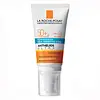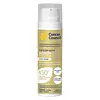La Roche-Posay Anthelios Ultra Facial Sunscreen SPF 50+ Versus Cancer Council Face Day Wear Serum SPF50+
What's inside
What's inside
 Key Ingredients
Key Ingredients

 Benefits
Benefits

No benefits
 Concerns
Concerns

 Ingredients Side-by-side
Ingredients Side-by-side

Water
Skin ConditioningDiisopropyl Sebacate
EmollientGlycerin
HumectantBis-Ethylhexyloxyphenol Methoxyphenyl Triazine
Skin ConditioningAlcohol Denat.
AntimicrobialPropanediol
SolventEthylhexyl Salicylate
UV AbsorberEthylhexyl Triazone
UV AbsorberC12-22 Alkyl Acrylate/Hydroxyethylacrylate Copolymer
StabilisingDrometrizole Trisiloxane
UV AbsorberButyl Methoxydibenzoylmethane
UV AbsorberAluminum Starch Octenylsuccinate
AbsorbentSilica
AbrasiveTocopherol
AntioxidantIsopropyl Lauroyl Sarcosinate
Skin ConditioningAcrylates Copolymer
Ammonium Acryloyldimethyltaurate/Vp Copolymer
Caprylyl Glycol
EmollientCitric Acid
BufferingDisodium EDTA
Scutellaria Baicalensis Extract
AntimicrobialT-Butyl Alcohol
PerfumingTerephthalylidene Dicamphor Sulfonic Acid
UV AbsorberTriethanolamine
BufferingXanthan Gum
EmulsifyingWater, Diisopropyl Sebacate, Glycerin, Bis-Ethylhexyloxyphenol Methoxyphenyl Triazine, Alcohol Denat., Propanediol, Ethylhexyl Salicylate, Ethylhexyl Triazone, C12-22 Alkyl Acrylate/Hydroxyethylacrylate Copolymer, Drometrizole Trisiloxane, Butyl Methoxydibenzoylmethane, Aluminum Starch Octenylsuccinate, Silica, Tocopherol, Isopropyl Lauroyl Sarcosinate, Acrylates Copolymer, Ammonium Acryloyldimethyltaurate/Vp Copolymer, Caprylyl Glycol, Citric Acid, Disodium EDTA, Scutellaria Baicalensis Extract, T-Butyl Alcohol, Terephthalylidene Dicamphor Sulfonic Acid, Triethanolamine, Xanthan Gum
 Reviews
Reviews

Ingredients Explained
These ingredients are found in both products.
Ingredients higher up in an ingredient list are typically present in a larger amount.
You might know this ingredient as Tinosorb S or Bemotrizinol. It is a UV filter that covers both UVA and UVB rays.
This ingredient has two peak UV absorption peaks ( 310 and 340 nm) and is able to absorb both UV-A and UV-B rays. This ingredient works by preventing UV rays from reaching and damaging your skin.
On top of that - it is highly photostable and helps prevent the photodegration of other sunscreen ingredients such as avobenzone.
Tinosorb S is allowed in the EU, Australia, and Asia. It is close to being approved by the FDA and we'll hopefully get this ingredient in the U.S. by late 2025.
Fun fact: Tinosorb S is the most effective UV absorber at maximum concentration (measured by SPF) permitted in the EU.
This ingredient is oil-soluble, so your oil-cleansers will take this right off at night.
Learn more about Bis-Ethylhexyloxyphenol Methoxyphenyl TriazineAlso known as Avobenzone, this ingredient is a chemical sunscreen filter that provides protection in the UV-A range.
Avobenzone is globally approved and is the most commonly used UV-A filter in the world.
Studies have found that avobenzone becomes ineffective when exposed to UV light (it is not photostable; meaning that it breaks down in sunlight). Because of this, formulations that include avobenzone will usually contain stabilizers such as octocrylene.
However, some modern formulations (looking at you, EU!) are able to stabilize avobenzone by coating the molecules.
Avobenzone does not protect against the UV-B range, so it's important to check that the sunscreen you're using contains other UV filters that do!
The highest concentration of avobenzone permitted is 3% in the US, and 5% in the EU.
Learn more about Butyl MethoxydibenzoylmethaneEthylhexyl Salicylate is an organic compound used to block UV rays. It primarily absorbs UVB rays but offers a small amount of UVA protection as well.
Commonly found in sunscreens, Ethylhexyl Salicylate is created from salicylic acid and 2-ethylhexanol. You might know salicylic acid as the effective acne fighter ingredient and BHA.
The ethylhexanol in this ingredient is a fatty alcohol and helps hydrate your skin, similar to oils. It is an emollient, which means it traps moisture into the skin.
According to manufacturers, Ethylhexyl Salicylate absorbs UV wavelength of 295-315 nm, with a peak absorption at 307-310 nm. UVA rays are linked to long term skin damage, such as hyperpigmentation. UVB rays emit more energy and are capable of damaging our DNA. UVB rays cause sunburn.
Learn more about Ethylhexyl SalicylateEthylhexyl Triazone is a modern chemical sunscreen that protects from UV-B radiation.
It is the most effective of existing UV-B filters, as it provides the highest level of photo-stable absorption. It protects from the entire UV-B range (280 to 320nm), with it's highest level of protection at 314nm.
Ethylhexyl Triazone is oil soluble, oderless and colorless, which mean it is able to be incorporated into a variety of different formulations.
It is not currently available within the United States due to slow changing FDA regulations. Outside of the US, it is used in formulations at concentrations up to 5%.
Learn more about Ethylhexyl Triazone